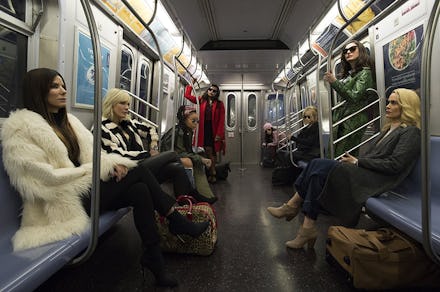‘Ocean’s 8’ isn’t quite the feminist film we were hoping for

When one particular member of the all-female entourage of grifters headlining Ocean’s 8 joins the team, the others register confusion. She has every reason to hate the rest of them, but with a tiny crack in her voice like a porcelain teacup, she explains she doesn’t have a lot of female friends and would just like the company.
You can scarcely blame her. The Ocean’s pictures have been organized around the pleasure of good company from their very start, the easy joys that come from throwing movie stars together and letting their chemistry enliven a big heist. The original 1960 collected all five members of the real-life gang of celeb buddies known as the Rat Pack, and likewise, Steven Soderbergh’s 2001 remake capitalized on offscreen friendships between cast members for a natural buddy-buddy rapport.
A slightly different rationale compelled Ocean’s 8, director Gary Ross’ new pass at the A-list hangout, into being: The Sony email leak of 2014 disclosed messages from studio head Amy Pascal hinting at an arms race between her own all-women Ghostbusters and Warner Bros.’ gestating caper comedy. As usual, it’s all the result of studio mandating, but the market research really shows on this one.
This is, to an extent, cynical thinking. I’d be remiss not to say Ocean’s 8 is an unabashedly womanly film, and that’s a net positive. A diverse cast of capable women occupy the screen with great aplomb, providing all the inspiring representation untold dozens of think pieces have demanded with every blockbuster season. A distinctly feminine appeal seeps into the deeper fibers of the film, too: the gratuitous shots gaping at gorgeous jewelry and dresses, the coup de grâce that grants our hero, Debbie Ocean (Sandra Bullock), revenge on a man who has wronged her. If this is trend-pandering, at least it’s a force for good in the most superficial sense.
But there’s a gap between a feminine film and the feminist one this project has been billed as since the earliest announcement of its premise. If there’s feminist content in the film — which was directed by a man who ended up sharing the screenwriting credit with the original draft’s author, Olivia Milch — it’s an apolitical, agreeable sort. In an on-trend update, the franchise’s usual fun of stars being pals takes the shape of spirited female solidarity.
But look closely and you’ll find the dynamic is handled in a perfunctory fashion. The relationships between the assorted members are vaguely defined in snatches of passing dialogue. Some of them are strangers, others barely interact with one another. All they’ve got in common is their gender and a shared objective of boosting a priceless diamond necklace. For the film’s purposes, that’s apparently more than enough.
Nobody’s saying the stylishly attired crooks should be discussing the finer points of Barbara Ehrenreich as they plot their infiltration of the Met Ball. The flip side of that concession, however, is that it’s opportunistic for a release so easy-breezy about its girl-power bona fides to position itself as part of a progressivist sea change. It’s undoubtedly a preferable alternative to forthrightly sexist films, tentpoles staffed entirely by the usual gang of square-jawed white men and lazy scripts inserting marginalized groups without giving real consideration to the dimension of identity they bring. All the same, Ocean’s 8 doesn’t quite earn the plaudits of principle for which it angles.
Comparing the merits and shortcomings of Ocean’s 8 with those of the Soderbergh trilogy forms a curious inverse image that speaks to a widening divide in how the public assesses and interfaces with art. While well-intentioned, Ross’ film is dramatically misconfigured to the point of insincerity. Soderbergh’s movies are all steeped in good-natured male camaraderie that doesn’t pose any challenges to the status quo (some might describe it pejoratively as “bro-hood”), but at least it’s all earnestly and believably enacted.
To those who look to entertainment for moral signposts, Ocean’s 8 is the more valuable cultural object, but under the traditional criteria of cinematic excellence, Soderbergh’s films are superior. On their own terms, each critic and recreational viewer must reckon with the question of whether Ocean’s 8 and its ilk are deserving of leniency and commendation for their conspicuous woke-ness — or chastising for using it as a sales tactic that easily curries favor.
For those viewers looking for an afternoon of diversion, either film will do. But Ocean’s 8 has purported to be more than a good time, promising a blow across the Hollywood patriarchy’s stern. What ends up as a totally anodyne outing falls short of the line it sets for itself, holding back on any meaningful subversion in favor of the mildly palatable. (To the film’s credit, it will provide a fine source of Cate Blanchett and Bullock GIFs bristling with sublimated homoerotic tension.)
If films — especially films made on a corporate scale — want to reap the benefits of mounting support for the feminist cause, they’ve got to do the work. An industry standard in which women get more work constitutes but half the task; the real follow-through is content worthy of the actresses bringing it to life. After all, putting in the bare minimum of effort and then claiming partially deserved praise is a guy thing.